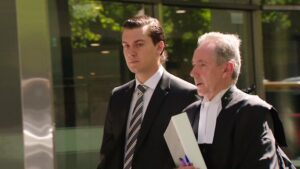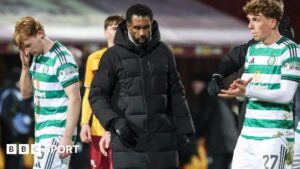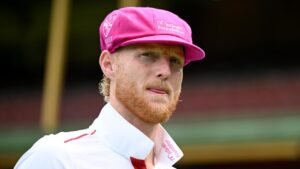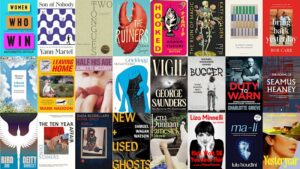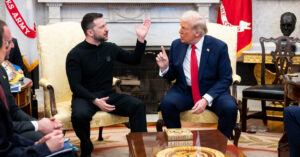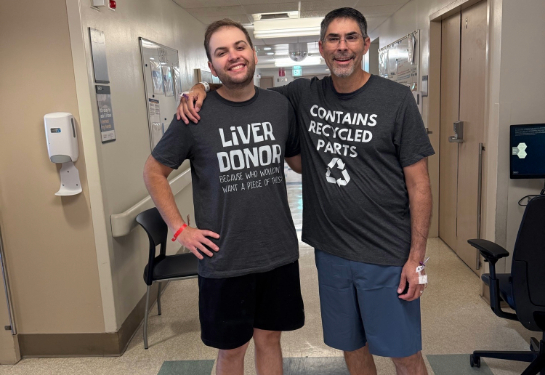
Andy Wright vividly recalls the moment he awoke from anesthesia following his liver transplant. His wife, Carie Wright, was by his side in the Intensive Care Unit of UC Davis Medical Center. It was there, amidst the beeping machines and sterile environment, that she noticed a profound change.
“Andy smiles again,” Carie remarked, capturing the essence of a journey that began years earlier.
In 2008, while serving on active duty with the US Air Force, Andy was diagnosed with primary sclerosing cholangitis (PSC) by Dr. Michael J. Krier, chief of gastroenterology at David Grant Medical Center. PSC is a rare, chronic liver disease characterized by inflammation and scarring of the bile ducts, leading to liver damage and potentially liver failure. Dr. Krier referred Andy to the hepatology team at UC Davis Health.
Exploring the Path to Transplant
For years, Andy’s condition remained stable, but about two years ago, his health began to decline rapidly. He lost 50 pounds and suffered from a range of debilitating symptoms, including portal hypertension, esophageal varices, encephalopathy, and ascites.
“Each day, I felt like I was just trying to survive,” Andy recalled, his voice tinged with the weight of those challenging years.
Despite his low MELD (Model for End-Stage Liver Disease) scores, a common challenge for PSC patients, Andy’s hepatologist, Dr. Christopher Bowlus, recommended him for a liver transplant.
When Andy and Carie met with the transplant team at UC Davis Health, they learned about the lengthy waiting period for a typical liver transplant from a deceased donor. To potentially shorten this wait, the team discussed the option of a living donor liver transplant, a procedure where a healthy person donates a portion of their liver.
“I didn’t realize a partial liver transplant was even an option,” Andy shared. “But I was hesitant. I didn’t want to put any of my family or friends at risk.”
However, the Wright family was deeply concerned about Andy’s deteriorating health. Unbeknownst to anyone, his son, Nick Wright, took it upon himself to get screened as a potential donor.
“One day, I had a really bad feeling I just couldn’t shake,” Nick recalled. “So, I decided to start the process. He needed it done.”
The Power of Living Donation
Living donor liver transplants are significantly less common than those from deceased donors in the United States. Candidates for this procedure must be healthy enough to thrive with only a portion of a liver.
“In Andy’s case, he was an ideal candidate for a living donor liver transplant,” explained Dr. Lea K. Matsuoka, section chief for liver transplantation at the UC Davis Transplant Center. “His MELD score was low, and receiving a transplant early could prevent further health deterioration.”
“The safety of the donor is always our top priority. They’re giving this gift out of the goodness of their heart, and we want to make absolutely sure nothing happens to them.” – Dr. Lea K. Matsuoka
After a thorough evaluation, Nick was found eligible to donate a portion of his liver to his father. Initially, Andy was apprehensive about the idea.
“When Nick first told me he wanted to donate part of his liver, I was apprehensive,” Andy admitted. “But with encouragement from family, friends, and the transplant team, I was convinced of Nick’s intentions.”
Father and Son Make Transplant History
On July 15, Andy and Nick underwent surgery with their family close by. Surgeons removed Andy’s failing liver and replaced it with the right lobe of Nick’s liver, approximately 60% of the whole liver. Remarkably, both the donor’s and recipient’s livers regenerate within six to eight weeks.
This procedure marked the first-ever living donor liver transplant at the UC Davis Transplant Center, a milestone celebrated by the team.
“This transplant marks a historic milestone for our center and a tremendous step forward in expanding access to life-saving care.” – Dr. Sophoclis Pantelis Alexopoulos
Healing Begins
Within hours of the procedure, Andy felt better than he had in over a decade. His liver panels were nearly normal for the first time in 20 years.
“It’s the little things you don’t even notice,” he said. “I hadn’t slept more than four hours a night in two years. It’s incredible to feel like I have my brain back.”
Andy expressed deep gratitude for the care he received at UC Davis Medical Center.
“The transplant team is incredible. They educate you and explain everything they’re doing,” he shared. “For them, patient care is the priority.”
Nearly a week after the procedure, Nick visited Andy in the hospital. Both were scheduled for discharge that day.
“It’s nice seeing him return to his old self,” Nick reflected. “It’s a huge relief for my entire family.”
Andy and Nick are now looking forward to a healthier future together.
“We’ve got some plans,” Nick said with a smile. “It’s exciting to have him back and to know he’ll be with us for a long time.”
When asked what advice he’d give to someone considering organ donation, Nick shared, “Donating part of your organ is a big decision, but when it’s for someone you love, there’s no hesitation.”
How UC Davis is Changing Lives Through Transplant Care
Inspired by Andy and Nick’s story? Discover how the UC Davis Transplant Center is transforming lives through innovative care, compassionate support, and world-class expertise. Whether you’re considering organ donation, exploring transplant options, or simply want to understand more, visit the UC Davis Transplant Center’s website to learn how to take the next step.
